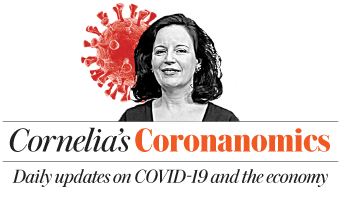What happened:
The number of people infected by the coronavirus disease (COVID-19) surpassed 2 million yesterday.
There were more bad numbers as US factory output contracted by 8.7 percent, which is the worst result since 1946. Retail sales declined by 6.3 percent against a consensus forecast by economists of 4.1 percent.
The picture is not even across the countries and sectors, depending how they were affected by the virus and the lockdowns.
UK numbers were equally dismal with retail sales down 27 percent – the largest decline since records began. The UK’s GDP is expected to contract by 35 percent during the second quarter.
Oil fell again close to 18-year lows when WTI briefly dipped below the $20 per barrel mark despite the historic OPEC+ deal, which curtails production by 9.3 million barrels per day (bpd).
The International Energy Agency predicted oil demand to decline by 9 million bpd for 2020 and 29 million bpd in April. The agency’s executive director, Fatih Birol, called 2020 the worst year in the history of oil and pointed out that 10 years’ worth of demand growth might be erased in one year alone.
US President Donald Trump is looking at paying some oil producers to leave crude in the ground, in another sign that American storage facilities are close to tank top and that bankruptcies of highly leveraged smaller oil producers would be a strain on the banking sector.
The G20 governments have agreed to a debt moratorium for the poorest emerging economies and developing countries. In a Bloomberg interview, Saudi Minister of Finance Mohammed Al-Jadaan praised the agreement as providing much-needed liquidity in conjunction with the swap lines of several central banks.
Several European countries are gingerly restarting some parts of their economies. While France extended the lockdown to May 11 and the UK is expected to extend its lockdown too, Germany opened for certain activities and pupils can gradually go back to school by May 3. Austria, Denmark and some regions of Spain and Italy have embarked on their own gradual easing journeys.
Trump is considering relaxing restrictions in the US amidst controversy over whether the powers lie with the presidency or the states.

Background:
Investment management company Bridgewater’s co-chairman, Ray Dalio, aptly pointed out that while it was a clear-cut choice for governments on whether or not to bail out banks, the field of who ought to be saved was much wider now.
He warned of investing in debt as it would balloon and require a reassessment and redefinition of the value of money, debt and wealth going forward. He pointed out that, “the world won’t resemble the world we are used to,” when we are coming out of the crisis.
Dalio has a point, especially in as much that the global economy will be organized much more along regional national lines with countries trying to achieve self-sufficiency in several sectors.
While there has been a massive push for globalization over the last three decades, that trend will be reversed to a certain extent having huge ramifications for many sectors.
Where there are losers there are always winners. Cash-rich sovereign wealth funds are looking to acquire company stakes at favorable valuations in falling markets. Popular sectors are healthcare, technology and logistics. Saudi Arabia’s Public Investment Fund has acquired stakes in Royal Dutch Shell, Total, Repsol, Equinor and Eni as well as having made some other investments.
GCC sovereign wealth funds are clearly among the institutions with much firepower. Other investors include well-capitalized turn-around funds and Chinese companies.
This is of concern to the EU, especially as far as Chinese investments are concerned. Its competition commissioner, Margrethe Vestager, told Bloomberg that it was important to remain vigilant as certain countries emerged from the economic downturn earlier.
There is a temporary framework with sufficient flexibility in place. Certain countries such as Germany and the Netherlands have legislation to block non-EU companies from taking over firms in key sectors either in place or under consideration. This is yet another sign that the new world order will not resemble the hitherto employed model of a globalized world without borders.

Where we go from here:
The International Monetary Fund and World Bank spring meetings are ongoing, albeit virtually. Expect the news flow to shed further light on the state of emerging and developing economies.
Thursday will also see a new set of numbers released for the eurozone in February – the last month before the lockdown set in. Figures due out on US jobless claims for the week ending April 10 are widely expected to come in at 5.5 million or above.

— Cornelia Meyer is a Ph.D.-level economist with 30 years of experience in investment banking and industry. She is chairperson and CEO of business consultancy Meyer Resources.
Twitter: @MeyerResources













